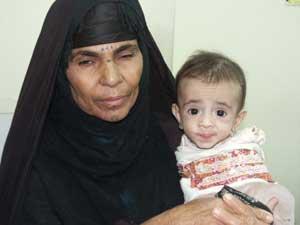Untitled Document

Saturday 18th June, 2005 - More than two years after the Iraq war started, children
continue to be its main victims as the health of the majority of the population
continues to deteriorate.
In the 1980s, Iraq had one of the best health-care systems in the region. Today
it cannot respond to the most basic health needs of the population. In 1991,
there were 1,800 health-care centers in Iraq. More than a decade later, barely
half remain and almost one-third of those require major rehabilitation. U.N.
Development Program's Human Development Index for the country has fallen from
96 to 127, one of the most dramatic declines in human welfare in recent history.
According to Jean Ziegler, the U.N. Human Rights Commission's special expert
on the right to food, the rate of malnutrition among Iraqi children has almost
doubled since Saddam Hussein's ouster in April 2003. Today, at 7.7 percent,
Iraq's child malnutrition rate is roughly equal to that of Burundi, an African
nation ravaged by more than a decade of war. It is far higher than the rates
in Uganda and Haiti, countries also devastated by unrelenting violence.
The population health problems are dramatically different than those facing
young Iraqis a generation ago, when obesity was one of the main nutrition-related
public health concerns. High rates of malnutrition started in the 1990s as a
result of the U.N.-imposed sanctions to punish the Hussein regime for invading
Kuwait in 1990. But following the 2003 invasion by the 'coalition' forces, the
cycle of insurgent violence and occupation forces' counterattacks have significantly
damaged the basic health infrastructure in the country.
Lack of dependable electricity and shortages of potable water throughout the
country have led to the deterioration of the population's health, resulting
in outbreaks of cholera and typhoid fever, particularly in southern Iraq. The
collapse of the water and sewage systems has probably been the cause of an outbreak
of hepatitis particularly lethal to pregnant women.
Presently, hundreds of thousands of children born after the war have had none
of their required vaccinations, and routine immunization services in major areas
of the country are all but disrupted. In addition, the destruction of the refrigeration
systems needed to store vaccines have rendered the vaccine supply virtually
useless.
Even antibiotics of minimal cost are in short supply, increasing the population's
risk of dying from common infections. Hospitals are overcrowded and many hospitals
go dark at night for lack of lighting fixtures. The Iraqi health minister claims
that 100 percent of the hospitals in Iraq need rehabilitation.
To compound the problem, international aid organizations such as Doctors Without
Borders and CARE International have closed their operations in Iraq because
of the persistent threat of violence. Both groups have traditionally had a high
tolerance to risk, and have built a remarkable record of cooperation with public
health authorities in the country. Facing increasing threats to their lives,
doctors have left the country. It is estimated that, in the past year alone,
10 percent of Baghdad's 32,000 doctors have left the country or have stopped
working.
Iraqi children not only have their health affected but also educational opportunities
as well. According to World Bank statistics, 25 percent of primary school-age
children do not go to school. Ministry of Education statistics state that 80
percent of the schools in Iraq need repair and 9 percent are in need of demolition.
This is the third time that Iraqi civilians, mostly children, have suffered
the consequences of war in that country's recent history. The two previous conflicts
were the eight-year war with Iran in the 1980s and the Persian Gulf War in 1991.
This is happening in a country where almost half of the inhabitants are under
the age of 18. As a result of these public health failures, Iraq is the country
that has least progressed in reducing child mortality since the 1990s.
That children must suffer to such an extent because of perverse war games is
a severe indictment against adults and those that orchestrated the war without
assessing its potential consequences on that country's civilian population.

